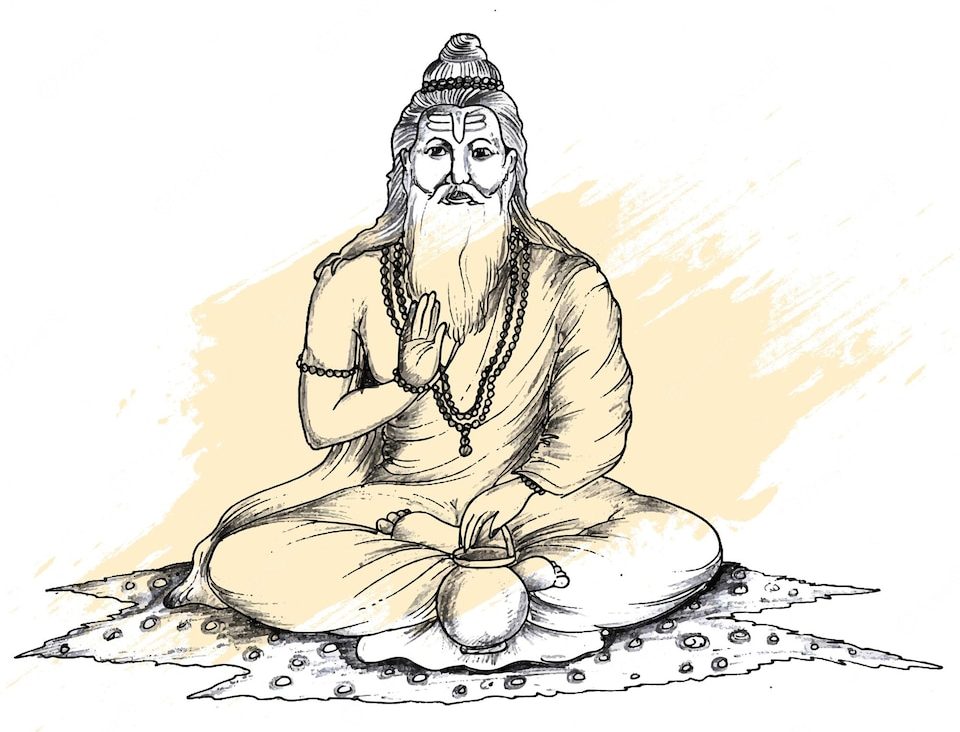
Maharishi Vyasa
The Compiler of Epics and Puranas
Introduction:
Maharishi Vyasa, a revered sage from the ancient era, holds a significant place in Hindu mythology and literary tradition. As the son of Maharishi Parashara, he is regarded as the compiler of the Mahabharata, one of the longest epic poems in the world. Maharishi Vyasa is also credited with authoring the eighteen Puranas, which are sacred texts that elucidate various aspects of Hindu cosmology, mythology, and philosophy. This article explores the life and contributions of Maharishi Vyasa, including his early years and education, his career as a sage and teacher, his relationship with the gods, his disciples, his contributions to Hindu culture, his enduring legacy, an overview of his contribution to Hinduism, the books attributed to him, and a conclusion highlighting his significance.
Early Life and Education:
Maharishi Vyasa was born to Maharishi Parashara and Satyavati. Despite being born in an unconventional manner, his lineage and divine heritage bestowed upon him immense wisdom and knowledge. He received a comprehensive education from his father and other enlightened sages, delving into the study of scriptures, philosophy, and the sacred Vedas. His exceptional intellect and divine insight laid the foundation for his future endeavors.
Career as a Sage and Teacher:
Maharishi Vyasa’s career as a sage and teacher was marked by his extraordinary literary contributions and spiritual wisdom. He played a pivotal role in preserving and disseminating Vedic knowledge by classifying the Vedas into Rigveda, Yajurveda, Samaveda, and Atharvaveda. Maharishi Vyasa’s role extended beyond the classification of the Vedas; he also composed the Mahabharata, the epic that encompasses the timeless wisdom and intricate narratives of ancient India. As a teacher, he imparted spiritual knowledge and guidance to his disciples, shaping their lives and enabling them to carry forward the tradition.
Relationship with Gods:
Maharishi Vyasa’s divine connection and relationship with the gods are prominent in Hindu mythology. He received blessings and guidance from celestial beings, which enriched his understanding of cosmic principles, dharma, and the nature of reality. His interactions with the gods, particularly his encounters with Lord Brahma and Lord Ganesha during the composition of the Mahabharata, exemplify his profound connection with the divine realm.
Other Disciples:
Maharishi Vyasa had several disciples who imbibed his teachings and contributed to the preservation and dissemination of Vedic knowledge. Among his notable disciples were Shuka, who became renowned for his mastery of the Vedas and spiritual wisdom, and Vaishampayana, who played a crucial role in narrating the Mahabharata to King Janamejaya. These disciples served as torchbearers of Maharishi Vyasa’s wisdom, carrying forward his legacy and contributing to the expansion of Hindu spiritual and philosophical traditions.
Contributions to Hindu Culture:
Maharishi Vyasa’s contributions to Hindu culture are immense and multifaceted. His compilation of the Mahabharata, including the Bhagavad Gita, provides invaluable insights into moral dilemmas, ethical conduct, and the path of self-realization. The Mahabharata serves as a repository of wisdom, encompassing profound philosophical discourses, captivating narratives, and invaluable life lessons. Additionally, Maharishi Vyasa’s authorship of the eighteen Puranas offers a comprehensive understanding of Hindu cosmology, mythology, genealogy, rituals, and moral principles.
Legacy:
Maharishi Vyasa’s legacy is profound and enduring. His contributions to Hindu culture and spirituality have left an indelible mark on the collective consciousness of the Hindu community. The Mahabharata, with its intricate characters and moral dilemmas, continues to be revered as a timeless epic that reflects the complexity of human nature and provides guidance for righteous living. The eighteen Puranas, attributed to Maharishi Vyasa, have played a significant role in shaping Hindu mythology, folklore, and rituals, connecting generations with the rich cultural heritage of ancient India.
Overview of Contribution in Hinduism:
Maharishi Vyasa’s contribution to Hinduism can be summarized as the preservation and dissemination of Vedic knowledge through the classification of the Vedas, the compilation of the Mahabharata, and the authorship of the eighteen Puranas. His works have become cornerstones of Hindu philosophy, spirituality, and cultural traditions, influencing countless individuals and providing profound insights into the nature of existence, the pursuit of dharma, and the paths to self-realization.
Books Written by Him:
Maharishi Vyasa is widely regarded as the author of the Mahabharata, which encompasses the Bhagavad Gita, and the eighteen Puranas. These texts collectively represent his literary contributions to Hinduism and continue to inspire seekers on the spiritual path.
Conclusion:
Maharishi Vyasa, the compiler of the Mahabharata and the author of the eighteen Puranas, occupies a revered position in Hindu mythology and literature. His exceptional wisdom, divine connection, and literary genius have enriched Hindu culture and spirituality. Maharishi Vyasa’s contributions, including the classification of the Vedas, the composition of the Mahabharata, and the authorship of the Puranas, have played a transformative role in shaping Hindu philosophy, ethics, and cultural practices. His enduring legacy continues to resonate with millions, guiding them on the path of righteousness, self-realization, and spiritual evolution.
Editor – Kaalchakra Team
[ Note – Before Concluding anything as a Finale, Please Go through Original Scriptures of Vaidik Literature Written in Sanskrit and Also with Meaning of That time of Language. Because English is a Limited language to Explaining the Deeper Knowledge of Vaidik Kaal. ]
